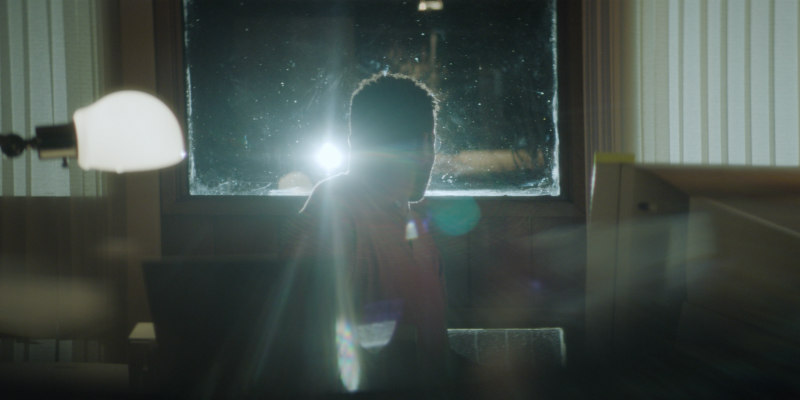
Review by Eric Hillis
Directed by: Kurtis David Harder
Starring: Jeffrey Bowyer-Chapman, Ari Cohen, Jennifer Laporte, Ty Wood, Chandra West, Lochlyn Munroe

The horror genre has long appealed to those who consider themselves outsiders, or those whom society pushes to the fringes. Many queer horror fans have found comfort in horror movies that reflect their experiences through allegory, yet horror films featuring LGBT protagonists are still a rarity. Director Kurtis David Harder's Spiral puts a gay man front and centre of a '90s set story that exploits the specific fear gay men still harbour today, that of being cast aside by a society that on the surface, claims to accept them.

As the opening flashback details, in 1983, Malik is witness to the homophobic murder of his boyfriend, an atrocity that leaves him reliant on medication to quell his PTSD. Cut to 1995 and things seem to have improved for Malik, now in his thirties and played by an impressive Jeffrey Bowyer-Chapman. He's just moved to a scenic stretch of suburbia with his older partner Aaron (Ari Cohen) and Aaron's teenage daughter Kayla (Jennifer Laporte), and he's beginning to make some headway in his career as a writer.
[ READ MORE: New Release Review - Nocturnal ]
The suburban dream soon turns into a nightmare as Malik realises he and his new family are in grave danger. A neighbouring couple talk a little too much of how they're okay with "you people" (which, given Malik's race, could be taken in one of two ways), in that suspiciously patronising tone of the white liberal. An elderly neighbour stares at Malik from afar yet refuses to respond to any friendly gestures. The subject of the biography he's ghost writing turns out to be a raging homophobe. Things ramp up when Malik returns home to find the F-word daubed in paint on his living room wall.

It's at this point you may begin having some trouble with Spiral. For some reason that's never explained, Malik immediately paints over the offending graffiti and keeps it to himself. I can understand if he wants to get rid of it before Kayla sees it, but why on earth would he keep it a secret from Aaron? Malik even goes so far as to have an alarm system installed without telling Aaron, and when the latter confronts him about this he still keeps mum about the graffiti. The film does establish that's there's a crucial difference between Malik and Aaron, with the latter readily able to adapt to straight white society when called upon, having spent a couple of decades in denial while married, while Malik always feels like an outsider. There's also the issue of Malik's fractured psyche (he speaks on the phone to his murdered boyfriend), which causes Aaron to dismiss his claims as paranoia. But this doesn't explain why Malik wouldn't seize the graffiti as the perfect opportunity to prove to Aaron that his fears aren't simply in his head.
[ READ MORE: New Release Review - The Devil All the Time ]
It's a tough ask, but if you can get over Malik's baffling decision, Spiral evolves into a tense psychological thriller. Malik finds himself manipulated by ambiguous forces, suffering blackouts that lead him to question his own sanity. An encounter with an elderly neighbour, who gives him a seemingly blank scrap of paper while warning him to be careful, leads him down a rabbit hole of investigating the town's disturbing history of murders occurring every 10 years, with the latest in the sequence due any day now. Kayla finds herself tailed by a mysterious masked figure, while her new boyfriend suspiciously refuses to partake in the loss of her virginity ("I want it to be special." Yeah, right.).

The script is co-written by Colin Minihan, who with movies like Still/Born and Z, has proven himself adept at fashioning old school movie of the week style thrillers, and has also recently given us queer protagonists in his script for lesbian thriller What Keeps You Alive. Like Still/Born and Z, Spiral features a protagonist who undertakes an investigation hoping to uncover the truth behind the dark forces menacing them, only to find themselves branded insane by their disbelieving peers. It's a format that goes right back to the gaslighting thrillers of the '40s, and which found small screen popularity in the '70s, but Minihan keeps finding ways to freshen up this trope while adhering to rigidly traditional storytelling. Here, Malik is the stand-in for the traditional wife whose husband writes her off as batty until it's too late and the proverbial shit hits the fan.
Unlike Minihan's previous scripts, Spiral suffers from a third act that descends into an exposition dump. Like Get Out, to which it will likely be compared, it features a lazily written scene in which the prone protagonist is forced to listen as one of the villains tells them, and the viewer, just what has been going on, as though they're Angela Lansbury wrapping up an episode of Murder, She Wrote. The explanation also makes us question some of the events depicted earlier, such as why Malik and Kayla were being intimidated if the villains needed them to stick around. In order to swallow the villains' motives, you have to disregard the existence of class dynamics and believe that the murders of affluent suburbanites would go unexamined. The appropriation of Satanic iconography also seems misguided given the theme of homophobia. There are certainly religious folk that gay people need to be wary of, but they sure ain't Satanists!

Spiral is on Shudder from September 17th.

